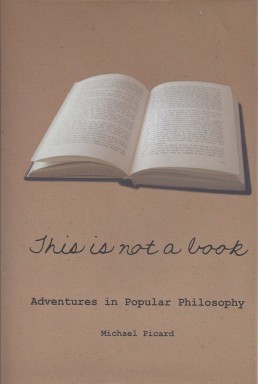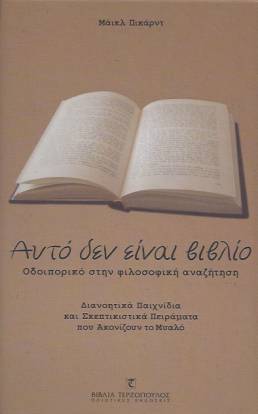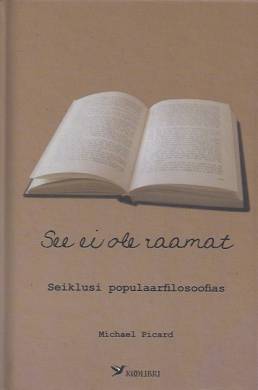This is Not a Book:
Adventures in Popular Philosophy

This is Not a Book will stretch your mind, put your neurons through their paces and challenge the foundations of your opinions and of knowledge itself.
Filled with philosophical puzzles that have intrigued great minds of many nations for centuries, insoluble logical paradoxes and moral dilemmas, This is Not a Book provides an intellect workout that will force you to confront the consequences of your beliefs.
This is Not a Book is divided into four sections, reflecting the major fields of philosophy: Logic, Epistemology, Ethics and Metaphysics. Each section includes a subject overview and philosopher profiles, as well as quizzes, games and thought experiments which apply the tools of philosophy to ultimate questions and everyday life.
Thought-provoking and logic-defying, This is Not a Book will test your view on reality
This is Not a Book, has been translated into:
FRENCH
GREEK
ESTONIAN
DUTCH
SPANISH
ITALIAN
Revised and expanded as (The Bedside Book of) Philosophy: Adventures in Thought and Reasoning (2012). This book has been translated into 6 languages and has sold 130,000 copies globally.
About This is Not a Book:
- won a Book of the Week award in UK within months of its release.
- among Top 50 Business Books in Australian Financial Review annual review Adopted as textbook at Renaissance College at University of New Brunswick
- translated into French, Greek, Spanish, Dutch, Italian, and Estonian.
- over 130,000 copies in print.


REVIEWS
Sunday Age Sunday 21/10/2007 Page: 33 Section: Supplements
Region: Melbourne Circulation: 225,000 Type: Capital City Daily
“Yes it is, a surprisingly cheap hardback. It also has the novelty of being printed on recycled paper, in colours from green to brown. In it, Michael Picard does philosophy for the “wondering masses”. As he notes, philosophy has never been solely for the elite, and everyone muses at some point about the meaning of existence. The un-book begins with epistemology, and ends with Georg Cantor. In between, Picard explores everything from Buddha to Einstein. The whole is conceived in bite-sized sections, easily digestible. Each ends with a logic or deductive game, to provide amusement with the education. The result is rather more interactive than a “Philosophy for Dummies”. In an era when everyone from government down seems hell-bent on encouraging stupidity, this effort is to be encouraged.”
Sunday Telegraph Sunday 21/10/2007Page: 103 Section: Insider
Region: Sydney Circulation: 671,500 Type: Capital City Daily. By Lucy Clark
“Dr Picard maintains that the average person with a house, a job and a car still wonders what the hell it all means sometimes”, which is his way of saying that philosophy isn’t just for scholarly minds. He therefore takes a good, thorough (and accessible) look at philosophical thinking and also exercises the reader’s mind with a range quizzes and tests that get you scratching your head and looking for solutions. Picard doesn’t just ponder life’s imponderables, he teaches the reader how to take a logical approach to problems big and small. It’s deliciously challenging for those who like to have the foundations of their knowledge shaken up.”
Sunday Mail Brisbane Sunday 4/10/2007
Page: 18 Section: Event
Region: Brisbane Circulation: 592,440 Type: Capital City Daily
“French Canadian Dr Michael Picard maintains that the average person with a house, job and car still wonders “what the hell it all means sometimes” – his way of saying philosophy is not just for scholarly minds. He scrutinises philosophical thinking and exercises the reader’s mind with quizzes to get them looking for solutions. With a bent for analytical thinking, Picard teaches the reader how to logically approach problems big and small.”
———-
“This is Not a Book, it’s a wondrous chocolate box of treats for the mind. None of those sickly sweet strawberry creams, either – these are gnarly little clusters you can really sink your teeth into. Some dark, some light, some a bit nutty (or at least psychological), these bite-sized nuggets of intellectual provocation are irresistible. Bet you can’t read just one!”
D. Stephen Lindsay, PhD. Professor of Psychology, University of Victoria
“Michael Picard is to be commended for his courage and persistence in the good work of bringing philosophy into the agora. In our traditions this was the role of Socrates, one of our major mentors. Picard’s nonbook in “Philosophical Games and Thought Experiments” offers challenging selections to exercise our minds and provoke deep reflection on weighty subjects. It is a considerable challenge to compose short vignettes of such daunting problems of deep philosophical significance such as paradigms of reason, Goedel’s Theorem, paradoxes of infinity and other topics.
“Picard’s preparation to write this nonbook is quite impressive starting with his advanced work in the foundations of mathematics and logic and also in Eastern philosophies, mediation practices and social issues. He created and has led over 500 sessions of Café Philosophy in Victoria where he lives. He has also created a supporting website plus a Philosophy Shop on line. He has taught courses covering a wide range of topics in philosophy and psychology.
“This is Not a Book is a delight to read. It is informative and provocative and can be read by both experts and also nonphilosophers. Picard and many of us believe that we are all philosophers or need to be. We need to know our own values, worldviews and personal philosophies, where we stand. This is part of being a whole, mature human. It gives one’s life more depth, unity and direction. The emerging cosmologies in the West owe much to a wide range of contributors, not only in the academic world, but outside of it. Today our daunting problems have profound philosophical implications and challenges we must meet, if we are to live in harmony within cultural and biological diversity. Picard thinks it is a responsibility of philosophers to put our inquiries into the heart of daily life. We should appreciate his worthy efforts.”
Dr Alan Drengson, Professor Emeritus, Philosophy, Adjunct Professor, Environmental Studies, University of Victoria,


